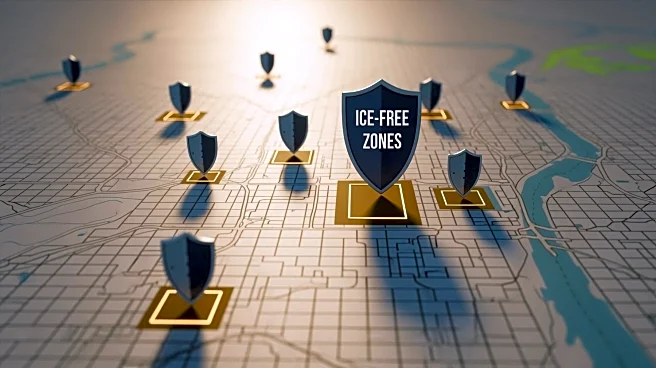What's Happening?
The Evanston City Council has adopted a resolution to create 'ICE-free zones' within the city, effectively banning federal immigration officers from using city-owned property for civil immigration enforcement.
This resolution, passed on October 13, does not include enforceable penalties against federal authorities but aims to limit their access through physical barriers like locked gates. The city manager's office is tasked with creating signs indicating 'ICE-free' properties, which will be available to businesses, medical providers, nonprofits, and faith institutions. The resolution is influenced by similar measures in Chicago, where federal agents violated the city's Welcoming City Ordinance by conducting operations on city-owned property. Evanston's ordinance already prohibits the use of city resources for civil immigration enforcement, which is not criminal or judge-approved. The council has previously called for transparency and accountability from federal agents, including a resolution urging a ban on law enforcement agents wearing masks.
Why It's Important?
The establishment of 'ICE-free zones' in Evanston reflects growing local resistance to federal immigration enforcement practices. This move is significant as it highlights the tension between local governments and federal immigration policies, particularly under President Trump's administration. By creating these zones, Evanston aims to protect its residents from what it perceives as aggressive and fear-inducing tactics by ICE agents. The resolution also underscores the city's commitment to being a welcoming community, aligning with broader efforts to safeguard immigrant rights. This development could influence other municipalities to adopt similar measures, potentially impacting federal immigration enforcement strategies and prompting discussions on the balance between local autonomy and federal authority.
What's Next?
The resolution's implementation will require the city manager's office to distribute 'ICE-free' signs and manage the physical barriers on city-owned properties. While the resolution lacks enforceable penalties, its symbolic nature may encourage other cities to consider similar actions. The ongoing debate over immigration enforcement could lead to further legislative efforts at the state and federal levels, particularly concerning the use of masks by law enforcement agents. Community advocacy and public pressure may continue to shape local policies, potentially leading to more robust protections for immigrants in Evanston and beyond.
Beyond the Headlines
The resolution raises ethical questions about the role of local governments in immigration enforcement and the protection of civil liberties. It challenges the notion of federal supremacy in immigration matters and highlights the cultural and social dynamics at play in communities with diverse populations. The move also reflects broader societal shifts towards inclusivity and the protection of vulnerable groups, potentially influencing national discourse on immigration policy and civil rights.









